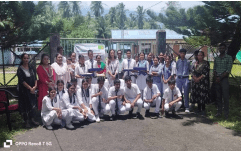A new initiative blending nutrition and sustainability has been rolled out in Car Nicobar, where school children in Arong village received table eggs while fruit-bearing and fodder trees were planted at the Composite Livestock Farm (CLF). The programme, carried out jointly by the Department of Animal Husbandry and Veterinary Services (AH&VS) and the Forest Department, is part of a broader effort by the Andaman and Nicobar Administration to strengthen food security and promote environmentally friendly agricultural practices.
The event was attended by members of the Tribal Council, the Education Officer In-Charge, teachers, students, and the Captain of Arong village. School children were given table eggs, a high-protein food source seen as vital to improving the health and nutrition of young people. The organisers emphasised that eggs, being affordable and nutrient-dense, are particularly valuable in island communities where dietary diversity can be limited. The distribution reinforced the administration’s focus on enhancing child nutrition as a key pillar of community welfare.
Parallel to the egg distribution, a tree plantation drive was conducted at the CLF in Arong. The Forest Department, in collaboration with AH&VS, led the planting of fruit-bearing and fodder trees, aimed at both supplementing livestock feed and supporting local ecosystems. Teachers, students, and community leaders participated in the activity, turning the event into a collective effort that combined education with environmental stewardship.
Officials highlighted that planting fodder trees will directly benefit livestock production by ensuring reliable feed sources, while fruit-bearing trees have the potential to provide additional nutritional and economic value to the community. This integration of livestock development and ecological balance is expected to create sustainable pathways for rural livelihoods in Car Nicobar.
The initiative is also being viewed as a demonstration of inter-departmental collaboration. By linking nutrition, agriculture, and environmental conservation, the AH&VS and Forest Department underscored the importance of breaking silos in government action. The Tribal Council’s active participation lent cultural and community significance to the event, reflecting local leadership’s commitment to child welfare and sustainable development.
The presence of school children in both activities also gave the initiative an educational dimension, exposing the younger generation to the values of nutrition, agriculture, and environmental protection. By combining practical benefits with awareness-building, the event sought to instill long-term attitudes toward healthy eating and ecological care.
This approach aligns with the broader vision of the Andaman and Nicobar Administration, which has repeatedly stressed nutritional security, sustainable agriculture, and community involvement as priorities for the Nicobar Islands. By focusing on grassroots engagement, the administration hopes to address multiple challenges , from malnutrition to ecological vulnerability , in an integrated manner.
Officials indicated that the AH&VS and Forest Department plan to continue similar drives across the Nicobar region, creating a network of interventions that tackle nutrition and sustainability simultaneously. With growing concerns over climate resilience, food security, and child welfare in the islands, the model showcased in Arong is likely to serve as a template for future efforts.
The initiative, though modest in scale, represents a symbolic yet practical step toward healthier children, stronger communities, and greener landscapes in Car Nicobar. It illustrates how a single event, when designed to combine immediate benefits with long-term goals, can leave an imprint that extends beyond the day’s activities.





